Navle study test - Study guides, Class notes & Summaries
Looking for the best study guides, study notes and summaries about Navle study test? On this page you'll find 16 study documents about Navle study test.
Page 2 out of 16 results
Sort by
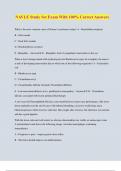
-
NAVLE Study Set Exam With 100% Correct Answers
- Exam (elaborations) • 22 pages • 2024
-
- $12.49
- + learn more
NAVLE Study Set Exam With 100% Correct Answers What is the most common cause of Horner's syndrome in dogs? A - Retrobulbar neoplasia B - Otitis media C - Neck bite wounds D - Brachial plexus avulsion E - Idiopathic - Answer️️ -E - Idiopathic, lack of sympathetic innervation to the eye When a foal is being treated with erythromycin (for Rhodococcus equi, for example), the mare is at risk of developing enterocolitis due to which one of the following organisms? A - Escherichia coli B ...
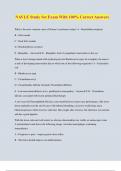
-
NAVLE Study Set Exam With 100% Correct Answers
- Exam (elaborations) • 22 pages • 2024
- Available in package deal
-
- $12.99
- + learn more
What is the most common cause of Horner's syndrome in dogs? A - Retrobulbar neoplasia B - Otitis media C - Neck bite wounds D - Brachial plexus avulsion E - Idiopathic - Answer️️-E - Idiopathic, lack of sympathetic innervation to the eye
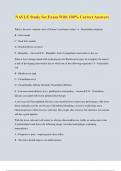
-
NAVLE Study Set Exam With 100% Correct Answers
- Exam (elaborations) • 0 pages • 2023
- Available in package deal
-
- $12.49
- + learn more
NAVLE Study Set Exam With 100% Correct Answers What is the most common cause of Horner's syndrome in dogs? A - Retrobulbar neoplasia B - Otitis media C - Neck bite wounds D - Brachial plexus avulsion E - Idiopathic - Answer️️ -E - Idiopathic, lack of sympathetic innervation to the eye When a foal is being treated with erythromycin (for Rhodococcus equi, for example), the mare is at risk of developing enterocolitis due to which one of the following organisms? A - Escherichia coli B ...
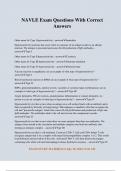
-
NAVLE Exam Questions With Correct Answers
- Exam (elaborations) • 17 pages • 2024
-
- $12.49
- + learn more
NAVLE Exam Questions With Correct Answers Other name for Type I hypersensitivity - answerImmediate Hypersensitivity reactions that occur when re-exposure of an antigen results in an allergic reaction. The antigen is presented and causes B cell production of IgE antibodies. - answerType I Other name for Type II hypersensitivity - answerCytotoxic Other name for Type III hypersensitivity - answerImmune-mediated Other name for Type IV hypersensitivity - answerDelayed type Vaccine reaction o...

-
NAVLE Study Set Exam With 100% Correct Answers
- Exam (elaborations) • 22 pages • 2024
-
- $8.99
- + learn more
What is the most common cause of Horner's syndrome in dogs? A - Retrobulbar neoplasia B - Otitis media C - Neck bite wounds D - Brachial plexus avulsion E - Idiopathic - Answer️️-E - Idiopathic, lack of sympathetic innervation to the eye When a foal is being treated with erythromycin (for Rhodococcus equi, for example), the mare is at risk of developing enterocolitis due to which one of the following organisms? A - Escherichia coli B - Rhodococcus equi C - Clostridium novyi D - ...
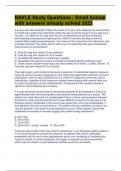
-
NAVLE Study Questions - Small Animal with answers already solved 2023
- Exam (elaborations) • 13 pages • 2023
- Available in package deal
-
- $18.49
- + learn more
NAVLE Study Questions - Small Animal with answers already solved 2023A 4-year old male neutered Pit Bull mix comes in to your clinic because his owner thinks he might have gotten into rodenticide while she was out of the house 2 hours ago but is not sure. You send her to bring back the box of rodenticide and induce emesis by administering subconjunctival apomorphine. Within 5 minutes, the dog vomits the material (thick bright turquoise/green). You rinse out the conjunctiva and administer oral ac...

How did he do that? By selling his study resources on Stuvia. Try it yourself! Discover all about earning on Stuvia


